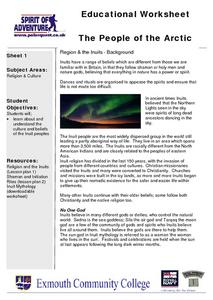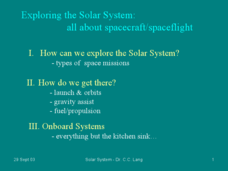Big Kid Science
Photographing the Eclipse Tips and Tricks Guide
Use a guide that provides safe ways for viewing the eclipse with a camera or telescope. The guide also includes tips and tricks for getting the best shot using a camera phone or SLR camera. You won't wanna miss this!
American Museum of Natural History
Meet the Universe's Main Attraction ... Gravity
Learners read a short description about gravity and what it does and then explore the two ideas about how gravity works. After gaining a better understanding of the concept, individuals participate in a thorough experiment on what would...
Curated OER
Weather Jeopardy
Fourth graders review weather terms by playing a game of Weather Jeopardy.
Curated OER
Space Science: Adventure is Waiting
These full-color handouts feature two activities. The first is a reading on comets, meteors, and meteoroids. Your space science learners will examine ten phrases and determine which of the three each characterizes. The second activity...
Curated OER
People of the Arctic
Read to learn all about the religion and belief systems of the Arctic-dwelling Inuits. This resource includes an easy-to-follow reading passage that is seven paragraphs in length, and five great critical thinking questions.
Curated OER
Exploring the Sky: Reading Maria's Comet
Discover the science behind astronomy. After reading the book Maria's Comet, which is about a young woman who breaks new ground by becoming a female astronomer, young learners practice reading comprehension with worksheet questions about...
Curated OER
Writing Myths I
Explain a natural phenomenon in an original myth. After researching the phenomenon they have chosen, young readers use factual information to include in their myth. They find synonyms and new phrases to create vivid images as they write...
Curated OER
Writing in Note Form
Taking notes is the topic today. Kids learn why notes are taken, when they are useful, and how to pick out the most important information to make their notes functional. Several interesting examples of various note forms are shown, along...
Curated OER
ASL: Lesson 14
Build your sign language vocabulary with this ASL instructional activity. Link to videos that show how to sign properly. Intended for those teaching or learning ASL as a mode of communication.
K12 Reader
Antonyms are Opposites
Knowing the opposite of your chosen word is a great step in improving your word choice. Young readers select an antonym from the provided word bank to complete a series of 14 sentences.
Curated OER
Figurative Language in Romeo and Juliet
Shakespeare was such a talented writer, but why? It must be his use of figurative language, blended with his clever, twisting plots. This worksheet focuses on his use of metaphor, simile, personification, oxymoron, and hyperbole within...
Curated OER
Exploring the Solar System: All About Spacecraft/Spaceflight
Rarely do you find resources that reach high school astronomy learners. Here is something at their level! The physics of flyby missions is explained via several examples. Landing, penetrating, and roving spacecraft are examined. Diagrams...
English To Go
Articles: A, An, The, or -
Help your young native English speakers discern between a, an, or the with this two-page document. Each article is explained before short practice assessments are offered. A short paragraph on the second page also explains what is known...
John F. Kennedy Center
Writing a Myth
Tap into the imaginative minds of young learners with a creative writing activity. After reading the myth Giants and Mosquitoes, this student guide supports young writers as they brainstorm and develop their very own creation myths....
Illustrative Mathematics
Making a Clock
Have a fun time teaching children to read analog clocks with this whole-group math activity. Using large sets of the numerals 1-12 and 0, 5, 10...55, the teacher creates a large clock on either the carpet or the white board, explaining...
Los Angeles Unified School District
World History Medieval and Early Modern Times
A slew of graphic organizers, worksheets, and student activities are packaged here for your world history pupils. From comparing and contrasting the Qur'an and Sunnah, studying cultural diffusion across eastern nations, or examining the...
Curated OER
Yoga Unit
Get in touch with your chakra with a thorough set of lessons on teaching yoga. Complete with tips, adjustments, examples, and procedures, each lesson encourages learners to trust their bodies and build both emotional and physical strength.
NASA
MASS, MASS – Who Has the MASS? Analyzing Tiny Samples
What is it worth to you? A hands-on instructional activity asks groups to collect weights of different combinations of coins and calculate weighted averages. They use the analysis to understand the concept of an isotope to finish the...
American Museum of Natural History
What is Marine Biology?
A marine environment covers the majority of the earth but is arguably the least understood. Teach young scientists about the characteristics of oceans and ocean species using an interactive online lesson. The in-person or remote learning...
American Museum of Natural History
Are YOU Cut Out for Antarctica?
Negative 80 degrees Fahrenheit, you say? Scholars complete a quiz to gauge their adaptability to the extreme climate of Antarctica. The quiz scored online gives them feedback of their likelihood of surviving in Antarctica.
Curated OER
The Tides
Students experience a computer based applet that explains why the Earth experiences tides.
Curated OER
Trace and Read Nature
In this nature trace and read worksheet, learners trace 16 nature words and phrases 4 times each. Students use the extra space to write the nature words independently.
Curated OER
Gravity, Seasons, and Time
In this Earth worksheet, students read about Earth's gravity, the reason the Earth has seasons, and time zones. Then students complete 21 multiple choice, 2 true or false, and 1 short answer question.
Curated OER
Tides and How Creatures Survive
Students discover tidal pools. In this oceanographic lesson, students observe the tides of the earth and the creatures that inhabit the intertidal zones. Students role-play the tidal zones by portraying themselves as animals of the...
Other popular searches
- Earth Moon Sun System
- Earth Sun and Moon
- Earth/sun/moon
- Sun and Moon Observations
- Sun Moon Earth
- Earth, Sun and Moon
- Space, Sun and Moon
- Earth and Moon and Sun
- Sun Moon Stars
- Moon, Sun and Stars

























